英语语法-特殊句式
专题13 特殊句式【课件】-2023年中考英语考前冲刺语法图解过关

满分秘籍
巧学妙记
提分特训
6.(2022·辽宁鞍山·中考真题)—China launched(发射)the manned
spacecraft Shenzhou-14 successfully on June 5, 2022.—________ exciting news!
We are proud of it.A.What B.What an
Olympic mascots(吉祥物). ________ lovely it is!A.What a
B.How
C.What an
D.What
【答案】B 【解析】句意:冰墩墩是2022年冬奥会吉祥物之一。 多么可爱啊!考查感 叹句。分析句子可知本句是感叹句,且中心词“lovely”是形容词,符合 “How+形容词+主谓”结构。故选B。
满分秘籍
巧学妙记
提分特训
3.(2022·四川遂宁·中考真题)—Sam, ________ run in the hallways. It’s very dangerous. —Sorry, Ms. Black.A.do B.don’t
C.not D.doesn’t
【答案】B 【解析】句意:——萨姆,不要在走廊里跑。非常危险。——抱歉, 布莱克女士。考查祈使句的否定形式。祈使句的否定结构:don’t+ 动词原形,故选B。
殊 句
How+主语+谓语!
反式
意 疑 问 句
倒 肯定倒装:So+助动词(情态动词/系动词)+主语. 装 句 否定倒装:Neither/Nor+助动词(情态动词/系动词)+主
语.
语法图解
(Please) 动词原形+其他. Make sure you turn off the light(, please). Be+表语(名词或形容词)+其他! Be quiet! Let+宾语+动词原形+其他. Let it go.
英语中考语法复习——句子种类(特殊句式)
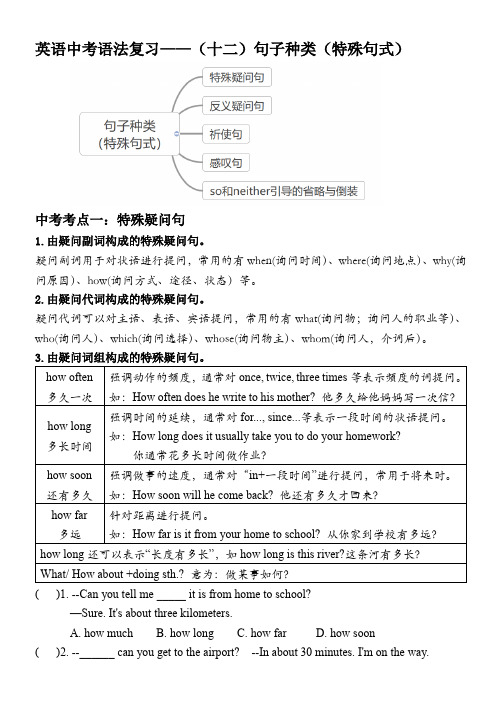
英语中考语法复习——(十二)句子种类(特殊句式)中考考点一:特殊疑问句1.由疑问副词构成的特殊疑问句。
疑问副词用于对状语进行提问,常用的有when(询问时间)、where(询问地点)、why(询问原因)、how(询问方式、途径、状态)等。
2.由疑问代词构成的特殊疑问句。
疑问代词可以对主语、表语、宾语提问,常用的有what(询问物;询问人的职业等)、who(询问人)、which(询问选择)、whose(询问物主)、whom(询问人,介词后)。
how often 多久一次强调动作的频度,通常对once, twice, three times等表示频度的词提问。
如:How often does he write to his mother? 他多久给他妈妈写一次信?how long 多长时间强调时间的延续,通常对for..., since...等表示一段时间的状语提问。
如:How long does it usually take you to do your homework?你通常花多长时间做作业?how soon 还有多久强调做事的速度,通常对“in+一段时间”进行提问,常用于将来时。
如:How soon will he come back? 他还有多久才回来?how far 多远针对距离进行提问。
如:How far is it from your home to school? 从你家到学校有多远?how long还可以表示“长度有多长”,如how long is this river?这条河有多长?What/ How about +doing sth.? 意为:做某事如何?( )1. --Can you tell me _____ it is from home to school?—Sure. It's about three kilometers.A. how muchB. how longC. how farD. how soon( )2. --______ can you get to the airport? --In about 30 minutes. I'm on the way.A. How soonB. How longC. How muchD. How often( )3. --______ have you worked here? —For just one month.A. How oftenB. How longC. How soonD. How much( )4. --We don't have much homework this weekend. Shall we go out together?—OK. What about_______A. to see B seeing C. to see D. sees中考考点二:反义疑问句A. 反义疑问句的标准形式反义疑问句的标准形式是。
高中英语:特殊句式语法总结

高中英语:特殊句式语法总结用来表示说话人强烈的喜、怒、哀、乐等感情的句子,叫感叹句。
感叹句由what 或how引导,具体用法如下表:感叹句记忆口诀:感叹句,并不难,what与how应在前。
形容词、副词跟着how,what后面名词连。
名词若是可数单,前带冠词a或an。
主词、谓语放后面,省略它们也常见。
祈使句的基本用法祈使句是用来表示命令、请求、建议或劝告等的句子。
常省略主语,谓语动词用原形。
1. 肯定的祈使句①句型:动词原形+其他成分。
Be careful!小心!②"Do+祈使句"表示一种强烈的感情或请求,do起强调作用。
③please用在祈使句中可以表示一种客气的语气,但please用在句末时,必须用逗号与其余部分隔开。
Close the door, please. 请关门。
2. 否定的祈使句①常用句型:Don’t+动词原形+其他成分。
Don’t be late for school again! 别再迟到了!②用Never开头:Never+动词原形+其他成分。
Never leave today’s work for tomorrow! 不要把今天的工作留到明天!3. Let引导的祈使句以Let开头的句子也是祈使句,表示陈述和建议。
其否定形式有两种:Let...not 或Don’t...Let us not be late. 让我们不要迟到。
Don’t let the boy play football in the street. 不要让这个男孩在街上踢足球。
祈使句与简单句、复合句之间的转换1. "Let’s + 动词原形 + 其他"可转换为"Shall we + 动词原形 + 其他? "。
Let’s go fishing thi s afternoon. =Shall we go fishing this afternoon?2. "祈使句 + and/or + 简单句"可转换为含if引导的条件状语从句的复合句。
英语语法—特殊句式

3 英语中部分倒装句式有哪几种情形?
答案:(1)只有这样我们才能取得大的进步。 (2)只有那时我才认识到友谊的价值。 (3)只有当你手头特别紧的时候,你才可以向我 借钱。
3 英语中部分倒装句式有哪几种情形?
翻译下列各组句子,注意部分倒装使用的条件 2. Hardly had I arrived home when the phone rang. 3. (1)Not until I began to work did I realize how much time I had wasted.
2 英语中完全倒装句式有哪几种情形?
3. Finally came the day when I stood on the stage to make a speech. 4. Off went the fire crackers.
答案:3. 我上台演讲的那一天终于来了。倒装条件: 时间副词finally放句首。 4. “啪”的一声鞭炮响了。倒装条件:状态副词off放 句首。
倒装、省略、插入语、反意疑问句
1 什么是倒装?
翻译下列句子,指出各句式特点 1. Now comes your turn. 2. Seldom do I eat out.
1 什么是倒装?
答案 1.现在轮到你了。句子的谓语动词comes放在主语 your turn之前,主谓倒装。 2.我很少外出吃饭。句子的谓语动词eat放在主语I之 后,但助动词do置于主语前。
(2) Not only does he speak English well but also he has a good knowledge of English culture.
(3) By no means will you be allowed to play computer games without finishing your homework.
英语语法知识点特殊句式
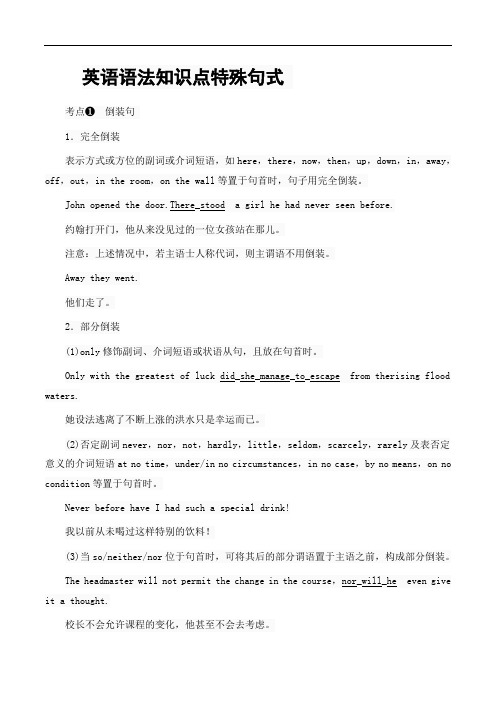
英语语法知识点特殊句式考点❶倒装句1.完全倒装表示方式或方位的副词或介词短语,如here,there,now,then,up,down,in,away,off,out,in the room,on the wall等置于句首时,句子用完全倒装。
约翰打开门,他从来没见过的一位女孩站在那儿。
注意:上述情况中,若主语士人称代词,则主谓语不用倒装。
Away they went.他们走了。
2.部分倒装(1)only修饰副词、介词短语或状语从句,且放在句首时。
waters.她设法逃离了不断上涨的洪水只是幸运而已。
(2)否定副词never,nor,not,hardly,little,seldom,scarcely,rarely及表否定意义的介词短语at no time,under/in no circumstances,in no case,by no means,on no condition等置于句首时。
Never before have I had such a special drink!我以前从未喝过这样特别的饮料!(3)当so/neither/nor位于句首时,可将其后的部分谓语置于主语之前,构成部分倒装。
it a thought.校长不会允许课程的变化,他甚至不会去考虑。
(4)hardly...when...,no sooner...than...,not only...but also...等连接两个句子且hardly,no sooner,not only位于句首时,前一个句子用部分倒装,后一个句子不倒装。
The computer was used in teaching.As a result,not only电脑被应用于教学中。
结果,不仅节省了老师的精力,学生也对课堂更感兴趣了。
(5)在so...that...和such...that...句式中,如果so或such引导的部分位于句首时,他取得了如此大的进步以至于受到了表扬。
高考英语 语法 特殊句式(强调、省略、主谓一致、倒装及其他)课件
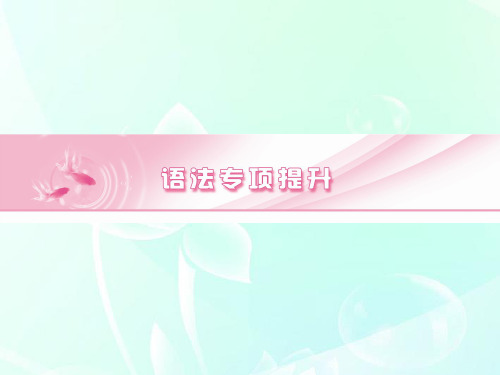
解析: 解析 :
考查省略。句意为:教授看到我们,虽然很惊讶, 考查省略 。 句意为 : 教授看到我们 , 虽然很惊讶 , 但还
是热情地欢迎了我们。本题考查非谓语动词作状语。 项为谓语动词形 是热情地欢迎了我们。本题考查非谓语动词作状语。 B项为谓语动词形 式 , 故 排 除 ; 分 析 句 子 结 构 可 知 though 后 面 省 略 了 主 语 和 谓 语 the professor was,而surprising表示事物的性质和特征,不符合语境;D项 , 表示事物的性质和特征, 表示事物的性质和特征 不符合语境; 项 在结构上不正确。 表示人的心理感受,故答案为C项 在结构上不正确。surprised 表示人的心理感受,故答案为 项。 答案: C 答案:
3.(2011·烟台检测 . 烟台检测)He is rather difficult to make friends with,but 烟台检测 , his friendship,________,is more true than any other. , , A.once gained . C.after gaining . B.when to gain . D.while gaining .
2.强调句型的一般疑问句只需将 /was 提前, 特殊疑问句的结构 .强调句型的一般疑问句只需将is/was提前, /was提前 从句” 是“疑问词+is/was+it+that从句”。 疑问词+is/ + + 从句 Was it yesterday that you met your teacher in the street? 你是昨天在大街上碰到你老师的吗? 你是昨天在大街上碰到你老师的吗? Who was it that told you such a thing? 究竟是谁告诉你这件事的? 究竟是谁告诉你这件事的? Why was is that you didn’t come to the meeting yesterday? 究竟是为什么你昨天没有来开会? 究竟是为什么你昨天没有来开会?
英语语法——特殊句式与主谓一致
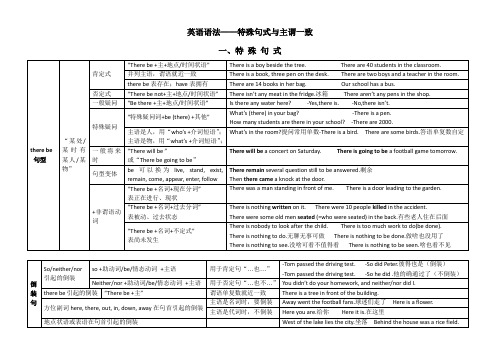
Thispairof shoesismine.
Fivepairsof shoeshavebeen sold out in the morning.
主谓倒装句中
谓语与它后面的主语一致
Therecomesthe bus. Suchwerehis words.这就是他的原话
population“人口”
谓语用单数
The population of Canada is 29 million.
有分数修饰,谓语最好用复数
Just under a third of the population now are smoking.
(4)主语为抽象名词news;学科名词maths, physics;专有名词James, the United States;游戏运动名词billiards台球
谓语用单数
The United States was founded in 1776.成立
Physics is very interesting.
clothes, goods, works(著作),the Olympic Games
谓语用复数
The expensive clothes were made specially for the beautiful princess.
Is there anything wrong with your bike?
Everything is ready for the sports meeting.运动会
不定式、动名词做主语
谓语用单数
To teach is to learn.教学相长Playing with fire is dangerous.
高中英语语法复习之特殊句式
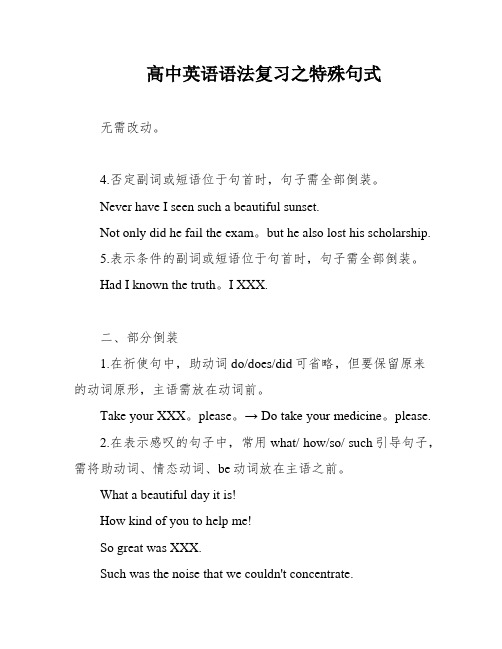
高中英语语法复习之特殊句式无需改动。
4.否定副词或短语位于句首时,句子需全部倒装。
Never have I seen such a beautiful sunset.Not only did he fail the exam。
but he also lost his scholarship.5.表示条件的副词或短语位于句首时,句子需全部倒装。
Had I known the truth。
I XXX.二、部分倒装1.在祈使句中,助动词do/does/did可省略,但要保留原来的动词原形,主语需放在动词前。
Take your XXX。
please。
→ Do take your medicine。
please.2.在表示感叹的句子中,常用what/ how/so/ such引导句子,需将助动词、情态动词、be动词放在主语之前。
What a beautiful day it is!How kind of you to help me!So great was XXX.Such was the noise that we couldn't concentrate.C.强调句强调句是指在句子中通过特殊的语法结构来强调某一成分,使其更加突出。
1.强调句的结构:It is/was + 被强调部分 + that/who + 其他成分。
It was Tom who won the first prize.It XXX.2.强调句中被强调部分的形式:可以是名词、代词、形容词、副词、动词、介词短语等。
It was the best movie I have ever seen.It is only with hard work that you can achieve success.3.强调句的注意事项:强调句中的被强调部分通常放在句首或句末。
强调句中的谓语动词要与其主语保持一致。
强调句中的that/who可以省略,但要注意谓语动词的变化。
高中英语语法:特殊句式
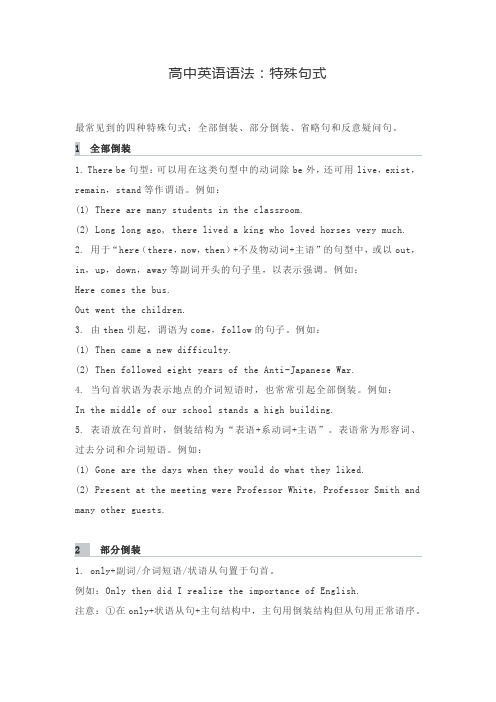
高中英语语法:特殊句式最常见到的四种特殊句式:全部倒装、部分倒装、省略句和反意疑问句。
1 全部倒装1. There be句型:可以用在这类句型中的动词除be外,还可用live,exist,remain,stand等作谓语。
例如:(1) There are many students in the classroom.(2) Long long ago, there lived a king who loved horses very much.2. 用于“here(there,now,then)+不及物动词+主语”的句型中,或以out,in,up,down,away等副词开头的句子里,以表示强调。
例如:Here comes the bus.Out went the children.3. 由then引起,谓语为come,follow的句子。
例如:(1) Then came a new difficulty.(2) Then followed eight years of the Anti-Japanese War.4. 当句首状语为表示地点的介词短语时,也常常引起全部倒装。
例如:In the middle of our school stands a high building.5. 表语放在句首时,倒装结构为“表语+系动词+主语”。
表语常为形容词、过去分词和介词短语。
例如:(1) Gone are the days when they would do what they liked.(2) Present at the meeting were Professor White, Professor Smith and many other guests.2 部分倒装1. only+副词/介词短语/状语从句置于句首。
例如:Only then did I realize the importance of English.注意:①在only+状语从句+主句结构中,主句用倒装结构但从句用正常语序。
特殊句式(强调、省略、主谓一致、倒装及其他)高考英语 语法

find out ________ the rich merchant.
A.who it was that killed C.it was who killed 解析: B.who was it that killed D.who was it killed
考查强调句型。强调句型的疑问句结构为:疑问词+is it
Dr Smith 将在今年夏天和妻子女儿们一起游览北京。
In my opinion,he,rather than you,is to blame. 依我看来,他,而不是你该受谴责。
(2)由there,here引起的主语不止一个时,谓语通常和最邻近的主
语保持一致。
There is a pencil and two pens in the pencilbox. 文具盒内有一支铅笔和两支钢笔。 2.意义一致原则 (1)谓语动词为单数的情况
2.(2011· 潍坊质量监测)When people cut down big trees,new
trees should be planted.________they will have no trees to cut down in the
future. A.If not C.If no so 解析: B.If so D.If don’t
语动词应该与or后面的名词保持一致,使用单数;根据语意可知,应该
使用被动语态。
答案: A
2.(2010· 海淀第二学期期末)—Have you heard that Jones,along
+that...而这里是强调句的疑问句结构作宾语,故用正常的陈述语序,
所以答案为A。
答案: A
1.在when,while,whenever,till,as soon as,if,unless,as if,
英语特殊句式语法

英语特殊句式语法一、概说英语语法中的特殊句式包括省略句、倒装句、强调句和虚拟语气等。
这些句式在英语中有着特殊的表达效果和意义,是英语语言的重要组成部分。
理解和掌握这些特殊句式,对于提高英语阅读、写作和口语表达能力至关重要。
二、省略句省略句是指在英语句子中,为了使语言更加简洁明了,省略掉某些成分的句子。
省略句可以是主语的省略、谓语的省略、宾语的省略等。
例如:It is raining heavily. (省略主语)The train leaves at 7:00. (省略谓语)I like reading books. (省略宾语)三、倒装句倒装句是指英语句子中的语序与常规语序相反,以强调某些词语或表达某种特殊意义。
倒装句可以分为全部倒装和部分倒装。
例如:Here comes the bus. (全部倒装)Only in this way can we solve the problem. (部分倒装)四、强调句强调句是为了突出某个词语或表达某种特殊意义而采用的一种句式。
强调句可以通过改变语序、使用强调词或使用强调结构来表达。
例如:It was he who found the solution to the problem. (使用强调词)It is on this issue that we need to focus our attention. (使用强调结构)五、虚拟语气虚拟语气是一种表示假设、想象或愿望的语气,与实际情况相反。
虚拟语气可以分为三种:与现在事实相反、与过去事实相反和与将来事实相反。
例如:If I were you, I would choose this option. (与现在事实相反)If he had known the answer, he would have given it to you. (与过去事实相反)If it were to rain tomorrow, we would cancel the picnic. (与将来事实相反)六、总结英语特殊句式语法是英语语言的重要组成部分,理解和掌握这些特殊句式对于提高英语阅读、写作和口语表达能力至关重要。
高考英语必备特殊句式大全(附高考英语常用词汇)
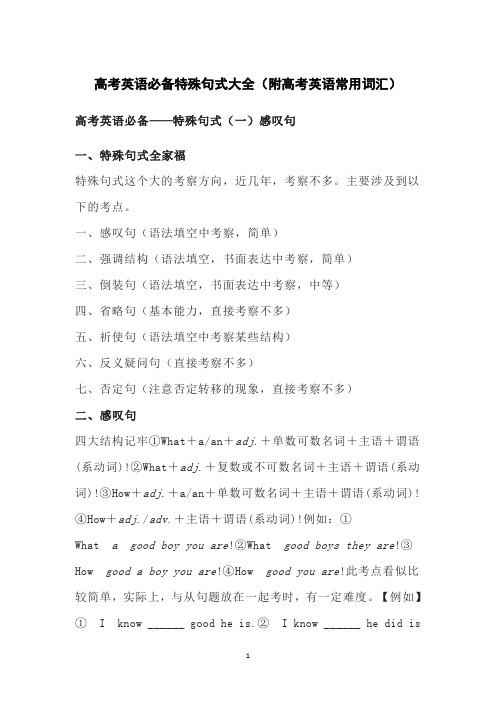
高考英语必备特殊句式大全(附高考英语常用词汇)高考英语必备——特殊句式(一)感叹句一、特殊句式全家福特殊句式这个大的考察方向,近几年,考察不多。
主要涉及到以下的考点。
一、感叹句(语法填空中考察,简单)二、强调结构(语法填空,书面表达中考察,简单)三、倒装句(语法填空,书面表达中考察,中等)四、省略句(基本能力,直接考察不多)五、祈使句(语法填空中考察某些结构)六、反义疑问句(直接考察不多)七、否定句(注意否定转移的现象,直接考察不多)二、感叹句四大结构记牢①What+a/an+adj.+单数可数名词+主语+谓语(系动词)!②What+adj.+复数或不可数名词+主语+谓语(系动词)!③How+adj.+a/an+单数可数名词+主语+谓语(系动词)!④How+adj./adv.+主语+谓语(系动词)!例如:①What a good boy you are!②What good boys they are!③How good a boy you are!④How good you are!此考点看似比较简单,实际上,与从句题放在一起考时,有一定难度。
【例如】①I know ______ good he is.②I know ______ he did isgood.在①中,答案为how,how good he is 是一个how 引导的感叹句;在②中,答案为what,what he did is good 是一个what引导的宾语从句问题来了,如何区分how,what引导的是感叹句还是从句呢?【答案】四个字,句!子!结!构!如宾语或者主语,或者表语;how引导的,其后是一个符合五大基本结构完整的句子。
【经典考察】(1)(2015年新课标卷Ⅱ)As natural architects, the Pueblo Indians figured out exactly ______(70) thick the adobe walls needed to be to make the cycle work on most days.【答案】how;how thick the adobe needed to be符合④How+adj./adv.+主语+谓语(系动词)!结构,故填how;(2)(2021年河南省天一联考)I recently spent a day in Hangzhou to see ______(65) easy it was to go cashless, and I found it somewhat ahead of other cities , including Beijing. I rode buses and subways, which all accept Alipay.【答案】how;how easy it is符合④How+adj./adv.+主语+谓语(系动词)! 结构,故填how;此外,初中的恶人搭配要记牢!how long;how soon;how far;how often;how many;how much【例】how long did he stay here?他在这里呆了多久How long is the river?这条河有多长?How often does he come here?他多久来这里一次?How soon will he be back?他多久之后会回来?How far is it from here to there?从这里到那里有多远。
英语特殊句式语法

英语特殊句式语法英语语法中存在一些特殊的句式结构,它们具有独特的语法规则和用法。
在本文中,我们将介绍一些常见的英语特殊句式,并通过示例来解释它们的用法。
一、倒装句倒装句是英语中常见的特殊句式之一,它采取了主语和谓语动词的位置颠倒。
倒装句的用法多种多样,下面是一些常见的情况:1. 完全倒装:当句子以表示地点状态的副词(如here, there, now, then等)开头时,需要完全倒装。
例如:Here comes the bus.There goes my hat.2. 部分倒装:在某些特定的条件下,主语和谓语动词的位置需要部分颠倒。
a. 在用于表示否定的副词或短语(如never, seldom, hardly, not until 等)开头的句子中,需要将助动词或情态动词与主语颠倒。
例如:Never have I seen such a beautiful sunset.Not until she left did I realize how much I loved her.b. 在以表示条件的状语从句(如if, unless, whether等)开头的句子中,需将助动词和主语颠倒。
例如:If only I had more time, I would travel around the world.Whether it rains or not, we will go camping.二、虚拟语气虚拟语气是英语中常见的特殊句式之一,用于表示与事实相反、假设或愿望等情况。
以下是虚拟语气的几种常见形式:1. 虚拟条件句:用于表示与事实相反的假设情况,包括类型1、类型2和类型3三种类型。
a. 类型1:表示真实可能发生的假设例如:If she studies hard, she will pass the exam.b. 类型2:表示与事实相反,但在理论上有可能实现的假设例如:If I were you, I would quit that job.c. 类型3:表示与过去事实相反的假设例如:If I had studied harder, I would have passed the exam.2. 虚拟表达愿望例如:I wish I could play the piano like a professional.3. 虚拟表达建议、命令等例如:The teacher suggested that they should review the material again.三、强调句强调句是一种特殊的句式,它通过强调句子中的某个成分来表达特殊的意义。
英语语法之特殊句式

英语语法之特殊句式特殊句型特殊句型包括祈使句、感叹句、强调句型、反意疑问句和There be句型。
祈使句祈使句用于表示请求、命令、建议或劝告等。
一般使用降调,为使语气婉转,可使用低升调。
句末使用句号或感叹号。
肯定的祈使句:关上门。
请安静!有时为了加强语气,可以在动词之前加上do,表示“务必,一定”。
一定要按时来。
一定要小心!否定的祈使句:祈使句的否定形式一般是在句首加don’t或never构成。
不要迟到。
做事不可马虎。
其他形式的祈使句:以let开头的祈使句:咱们休息一会。
我们不要大声说话。
以no开始的禁止性祈使句:禁止停车。
禁止吸烟。
祈使句+陈述句句型:在“祈使句+陈述句”这种结构中,祈使句和陈述句之间要用连接词。
连接词分为两类:第一类:and。
then。
and then。
意思是“就”、“那么(就)”、“(刚)才“。
第二类:or。
or else。
otherwise。
意思是“否则”、“要不”、“不然的话”。
使用and和or的方法:选择连接词,只看陈述句。
and叫人心欢畅,or的后果不好尝。
使用第一类连接词和第二类连接词的方法:比较下面三组例句:1)Come early。
and you’ll catch the first bus.早点来,你就能赶上第一班汽车。
Come early。
or you’ll miss the first bus.来早点,不然的话,你就赶不上第一班汽车。
2)Use your head。
then you’ll find a way.开动脑筋,那么你就会找到办法。
Use your head。
or else you won’t find a way.开动脑筋,否则,你就找不到办法。
Work hard。
otherwise you will fail。
This shows that when stating the desired e。
one should use "and"。
- 1、下载文档前请自行甄别文档内容的完整性,平台不提供额外的编辑、内容补充、找答案等附加服务。
- 2、"仅部分预览"的文档,不可在线预览部分如存在完整性等问题,可反馈申请退款(可完整预览的文档不适用该条件!)。
- 3、如文档侵犯您的权益,请联系客服反馈,我们会尽快为您处理(人工客服工作时间:9:00-18:30)。
• 2.在if 条件句中,通常可以省略if ,而将从句倒装 条件: 在if 条件句,必须含有系动词were, 助动词 had 和 情态动词should
Were he younger(=If he were younger ),he would learn skating .
Should they forget (=If they should forget ) to bring a map with them ,they would get lost in the woods .
home . Often did I advise him to give it up . Only he was right . Only +主语位于句首不倒装
• 6. So\such…that 句型中,以so\such 开头的句子 中,主句要部分倒装
• 1.So loudly did he speak that even people in the next room could hear him .
• 1) Here comes the bus . • 2) There goes the bell . • 3) Away went the students . • 4) Now comes the chance .
注意:1.不能用进行时; 2. 主语为人称代词时不 倒装。
• 5) Out rushed the children.
• Do come early next time. • He did send you a letter last week.
• 2. “It is /was +被强调部分 +that/ who (m)…”强调句型
• “It is /was +被强调部分 +that/ who (m)…” 句型中的it 没有实际意义,只是用来改变 句子结构,使句子的某一成分得到强调。 所强调的可以是谓语以外的其他任何成份, 如主语、宾语、状语等。
Had they realized (=If they had realized ) how important the task was ,they wouldn’t have refused to accept .
Were I you ,I would help her .
• 3.否定词或半否定词 (never, little ,seldom ,not ,nowhere无处, few , by no means
• 2) In front of our school stands a tower .
• 3) By either side of the river grow a lot of apple trees .
• 4) At the top of the mountain stands a temple .
否定词/包含否定词的词组
• 原句:I didn’t get up until 9:00. • 倒装: Not until 9:00 did I get up.
So /such… that…
• 原句:He spoke so fast that I didn’t understand him.
• 倒装: So fast did he speak that I didn’t understand him.
特殊句式
(强调句、倒装句、省略句)
英语语法专项
强调句
• 强调是有效地进行思想交流的重要手段之 一。人们在交际过程中,为了使自己的思 想能被对方恰当地理解,必须加强语气, 突出重要的内容,增加对比效果与感情色 彩,这时就会用到强调。
• 1. “助动词do (does/did)+谓语动词”的强调形 式 “助动词do (does/did)+谓语动词”是英语中强 调谓语的方法。在这里do的含义是“的确,务必, 千万,真的”。
动词
• Child as he is, he knows a lot about the world. =Though he is a child, he knows a lot about the world.
• 单数可数名词作表语提前不用冠词 Young as he is, he knows more than you.
So单独出现在句首
• Mary had a good time last night. • So she did, and so did I.
• 2.以介词短语表示的状语,提前位于句首时,全 部倒装。
• 1) In a lecture hall of a university in England sits a professor .
倒装句
• 倒装句是指句子成分不是按照主语在前、谓语在 后的正常语序排列,而是将谓语或谓语的一部分 一到主语之前。
• 倒装句是一种修辞手段,目的是为了强调。 • 倒装分为完全倒装和部分倒装。 • 完全倒装的方法是把句子的主谓语序颠倒过来,
把谓语移到主语前面。 • 部分倒装是把句子谓语的一部分(主要是助动词
• 4.以not until ,no sooner …than , hardly …when ,not only …but also 所引导的状 语放在句首时,需要部分倒装
Not until 10’clock the will library open .
No sooner had I gone out than he came to see me .
• 5) Among the goods are Christmas trees,flowers and toys.
• 3.表语位于句首时,倒装结构为“表语+连系动 词+主语”
形容词+连系动词+主语
Present at the meeting were Professor
White,Professor Smith and many other guests.
He went to the film last night. So did I . You must finish your work, so must I . She is interested in the story, so am I . He didn’t turn up. Neither did his brother . His mother told him not to go to the film. So he
倒装句
必须弄清的两点:
①若有主从句,哪句倒装。 ②部分倒装还是完全倒装。
完全倒装
• 1.表示方位和时间的副词位于句首时(now ,then, here ,there, out ,in ,up, down ,away ,back, off, on ), 句子 全部倒装。注:主语是代词时, 不倒装。(如5,6)
• (3) 被强调部分的人称和数 • 被强调部分如果是原句的主语,who/that
后面的谓语在人称和数上应与原句主语保 持一致
• It was they that were talking and laughing. • 是他们在又说又笑的。
• (4)强调句指人和指物的情况 • 被强调部分指人时,It is (was)… 后用who(强调
Hardly had the train arrived when I ran to meet my friend.
Not only does she speak English but also she follows the British way of life .
• 5. only 及其修饰的状语位于句首时,后面的句子部分倒 装。
• (1)强调句型的时态 • 原句中的谓语动词时态是一般过去时、过
去将来时、过去进行时或过去完成时等表 示过去的时态时,用It was… that… • 表示现9在的时态时,用It is… that…
• It is the computer that is doing many jobs. • When was it that the football match started?
• 8. 在某些表示祝愿的句型中,用部分倒装。 May you can have a sweet dream.
省略句
• 省略句是英语的一种习惯用法。出于修辞 上的需要,本该具有的成份在句中并不出 现,这种句子叫做省略句。
• 其特点是: 虽然省去句子语法构造所需要 的组成部分,但仍能表达其完整的意义。 省略形式多样,从单词、短语到分句,都 可省略,而且各有一定的衔接关系。
主语), whom(强调宾语)或 that均可 • 指事物或情况时,通常用that(不用when,
where,which等)
• It was yesterday that he saw me in the park.
• It was in the street that they quarreled.
或系动词)放到句子主语前,构成部分倒装。
英语倒装句分为两种:
1、整个谓语在前的句子,叫完全倒装句。 Here comes the car.
2、部分谓语(情态动词、助动词、连系 动词)在前,谓语的主体部分仍在主语之 后的句子,叫部分倒装句。 Only then did he realize that he was wrong.
决不 ,at no time 从不)位于句首,应部分倒装
Never have I been there . Little did I know about it . Seldom did she come late to school . Not a single mistake did he make . By no means should you buy that kind of car
